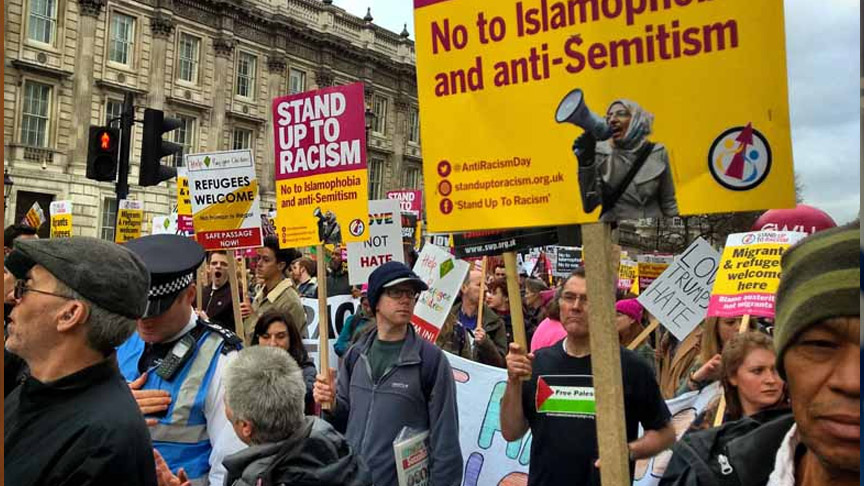
Elham Asaad Buaras
The UK Government must implement a coordinated national strategy to tackle anti-Muslim hatred or risk exacerbating social fragmentation, undermining public trust in institutions, and facing substantial economic costs, warns a new policy report released on June 9.
Produced by the public policy think tank Equi, the report draws on national polling by Savanta/ComRes, insights from 14 focus groups, and an analysis of a public information campaign to provide a comprehensive overview of public attitudes and the far-reaching consequences of anti-Muslim hostility.
Titled Britain United: Tackling Anti-Muslim Hatred Is Part of the Solution, the report estimates that the economic cost of anti-Muslim hatred in 2024 alone reached at least £243 million, covering riot policing, criminal justice proceedings, insurance claims, and compensation payouts. It identifies anti-Muslim hatred as a key barrier to social cohesion and intercommunity trust, especially following flashpoints such as the 2024 summer riots.
The report also highlights how alienating government policies—most notably the Prevent counter-extremism strategy—have contributed to feelings of isolation and mistrust within British Muslim communities. Additionally, it points to the growing influence of misinformation in skewing public perceptions, warning that without effective countermeasures, societal divisions will only deepen further.
Despite these challenges, the report, released on June 9, offers grounds for cautious optimism. Polling shows that 84 per cent of the British public hold neutral or positive views towards Muslims, with only 16 per cent expressing concerns about Islam or Muslims. However, a widespread lack of understanding of Islamic beliefs and practices remains a significant barrier to stronger solidarity. Many focus group participants were unfamiliar with core concepts such as Zakat, one of Islam’s fundamental pillars, but their views shifted more positively when provided with clear, relatable information.
Professor Javed Khan, Managing Director of Equi, described the report’s findings as both a warning and a blueprint for action. “Britain’s diverse and welcoming cultural identity is one of its greatest strengths. But we cannot leave social cohesion to chance,” he said. “Failing to address social division is not only unjust but fiscally draining, especially when resources are scarce.”
Khan called on the Government to use its institutional influence to rebuild social trust. “Knowing most Britons are not getting drawn into divisive language that can destroy community relations should give us hope. The government must use its unique platform to promote a unifying vision for the nation—one centred not on reacting to division, but on championing shared values like respect, equality, and liberty.”
Key recommendations include establishing a cross-government strategy to combat anti-Muslim hatred, ensuring active cooperation among Whitehall departments, local authorities, faith groups, and civil society organisations. The report also advocates for sustained public awareness campaigns to challenge damaging stereotypes and highlight the positive contributions of Muslims to British life.
Moreover, the report stresses the need for increased investment in youth and community-led initiatives that encourage civic engagement and inclusive social spaces, aiming to strengthen intercommunal ties and prevent the spread of polarising narratives.
Participants in the study responded most positively when presented with practical examples of Islamic values in action. One participant, a 60-year-old white male, reflected a common sentiment: “The only time you hear about Islam on TV is usually extreme. That gives a fairly negative view, but when I interact with followers of Islam, they are often kind, gentle, family-type people.”
The report concludes that building trust, inclusion, and civic resilience must become a national priority. Without a strategic response, it warns, anti-Muslim hatred will continue to threaten national unity, economic stability, and the legitimacy of British democratic institutions.
(Photo Credit: MarchAgainstRacism -CC)